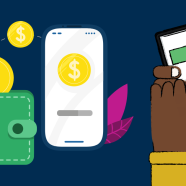Share This
Zelle vs Cash App: Differences, Fees & Which Is More Secure?
The two most popular and competing financial apps in the US are Zelle VS Cash app. They allow transactions within the state. Data transfer for both services is fast and free, but each has its characteristics. Therefore, we will analyse each application and their significant differences in this article.
A little about each of the applications
Many users are often faced with a choice: what is more profitable and safer for online money transfers: a Cash app or Zelle? But to make the right choice, you must consider all aspects of each application.
Zelle is a classic app that allows you to receive and send money to bank accounts without service fees. Cash App also allows you to make financial transfers between accounts and store funds on your balance sheet, providing access to various functionality. In addition, thanks to the Cash App, it is possible to request money. The main distinctive feature of this service is that the user can have a personal balance to which funds can be transferred. Customers are also provided with a debit card, which can be used to withdraw money from an ATM. Cash app goods and services allows you to pay for goods in the store. Cash App also has an investment platform.
Is Cash app legit? Of course, since the banking system will only have contractual obligations with providers who operate legally.
To visually compare the two financial providers, let’s present the Zelle VS Cash app competition as a table.
| Functional | Zelle | Cash App |
| Sending funds | Within US borders only | Within the borders of the USA and Great Britain |
| Receiving funds | Funds go to an individual bank account | Funds are credited to the virtual balance |
| Sending limits | If the application is offered by a bank, it will set its own limits | Limits depend on account availability |
| Commissions | None | Charged for instant transactions, ATM withdrawals, and company business transactions |
| Card | Not provided | Provided |
| Reliability | High – funds will not be stored in third-party locations | The presence of a wide range of tools and the card slightly reduces the level of security |
| Investment | No | Yes |
| Cash withdrawal | Not provided | Available at ATMs |
| Tax return | Not provided, reporting required by law | Formed |
Each payment system promotes its application to attract as many users as possible. There are no ideal services; there will be both advantages and disadvantages. And you can only judge how secure is Cash App? and Zelle is objective. Everything will depend on the functionality used and the level of responsibility of the users. But as a rule, the more instruments a financial service offers, the greater the risk. Of course, the choice is up to the clients, based on the individual needs that the provider can satisfy. As you can see, there are many more cons of Zelle than the Cash App.
Security level
This section will determine how secure is Cash App and whether Zelle is reliable. Both services use two-level identification (account verification) and particular encoding of personal data. But due to the fact that the services they offer are different, their regulation is different from each other. As a recommendation, it is better to transfer funds only to those in whom trust has been formed. Since fraud always occurs, it will not be possible to return the money.
Is Cash App reliable, and how reliable is it? Cash App is considered a safe service because it works with banks that have FDIC insurance. As soon as the account is verified, the user will be sent a routing number and account to keep his finances balanced with his partners. If a Cash App goes bankrupt, the FDIC will cover the Cash App balance per user for $250,000. It is important to note that the FDIC will not fund investment balances. Therefore, the risks associated with this aspect should be taken into account.
Is Zelle reliable? This application provides a high level of security for the safety of personal data and transfers. Since this service deals only with digital transfers, excluding using accounts, there is no need to use banking, which the FDIC insures to ensure the safety of investments. If the person to whom the funds are sent has a Zelle registration (email, phone number), the transfers will be secure. Otherwise, it is safer to transfer using a credit card. Because in case of fraud, it will be impossible to cancel the transaction if the recipient disagrees.
Quality of application and service
Next, we will compare the Zelle VS Cash app to determine what these applications represent regarding financial instruments. Both applications can be easily installed on two operating systems: Android and iOS. This comparison will be more difficult because these services provide different services. Zelle is best used for interbank transactions with friends and family. The Cash App is designed for peer-to-peer payments, storing savings, and other functionalities.
These services are similar to each other as follows:
- provides the opportunity to receive and transfer money to individuals and legal entities;
- no monthly payment.
The main difference is that Zelle makes digital transfers between banks, while Cash App allows you to store money in the application itself. Below, we will consider which is better: a Cash app or Zelle for carrying out transactions.
Methods for sending funds
Is Zelle reliable? Clients of the Zelle service can send funds to the accounts of other persons only to US banks. To do this, you must use the email or mobile number of the person to whom the transfer is intended. If the recipient is not registered with Zelle, they will receive a message about the transfer. If he does not note within two weeks, the money sent will be returned to the sender. In this case, there is no doubt whether Zelle is reliable.
Cash App customers can send funds to a registered person in this application immediately. Just like Zelle, if the recipient does not accept the funds, they will be returned to the person who sent them. You can also top up your account in the following ways:
- Cash.
- Bank transaction.
- Card replenishment (debit or credit).
This is a significant advantage over its main competitor, Zelle.
Possibility of international transfers
The Cash App allows cross-border transactions between customers in the US and UK with no fees. In addition, the market average exchange rate is used, unlike other payment systems. The downside of Zelle is the need for more international transfers.
Investment opportunities
The Cash App goods and services provide the opportunity to purchase shares, excluding commission for this opportunity. It also allows access to the purchase/sale of virtual currency, which will be 1.5-2.3% per purchase. Is Cash App reliable? Not really, since certain risks are associated with losing digital coins. The Zelle app does not have an investment option.
Financial card
Is Cash App legit? It issues a debit card connected to your balance. The user may be given discounts on some products if the funds are spent. Cash App does not give a card for a loan. The Zelle service does not provide cards because it does not provide a function for storing money on a balance. Who wins here: Cash App or Zelle – of course, Cash App, if you can’t do without a card.
Formation of a tax return
The Cash App system can process tax returns. In addition, all taxes are refundable, and there is no charge for these services. Zelle does not have this option, so users will be responsible for filing a return by local tax laws.
Who has the lowest commission?
Let’s consider what is more profitable in terms of commissions: a Cash App or Zelle. Both services have no fees for opening an account or monthly maintenance fees. Therefore, sending and receiving funds can be done without additional costs.
Transaction fee
Zelle does not charge fees for bank transactions. You should only pay attention to whether the bank pays a commission for using this service. However, many American banks provide this payment system for free.
In this case, there are Cash App stock pros and cons. The Cash App service also provides free transactions. When replenishing a personal account, the transfer may take up to three working days. But if you need to transfer funds instantly, the commission will be 0.5-1.75%, and for replenishing using a credit card, the user will be charged a 3% commission.
Payment for cash withdrawal from an ATM
The Cash App charges 2 USD when withdrawing money from an ATM using a debit card. But there are some categories of users for whom this commission will be absent – you need a deposit of 300 USD or more to be added to your account every month. In this case, the Cash App stock pros and cons are apparent. Since Zelle does not provide a card, receiving cash from an ATM is impossible.
Business transaction fee
The financial provider Cash App charges companies a commission of 2.5% for the transaction (trade of products, services) and 2.75% if the payment was made using a credit card. However, the Zelle provider, in this case, does not charge a commission, and this is a substantial financial advantage. Transactions can be carried out using email or mobile numbers because the service uses no cards.






